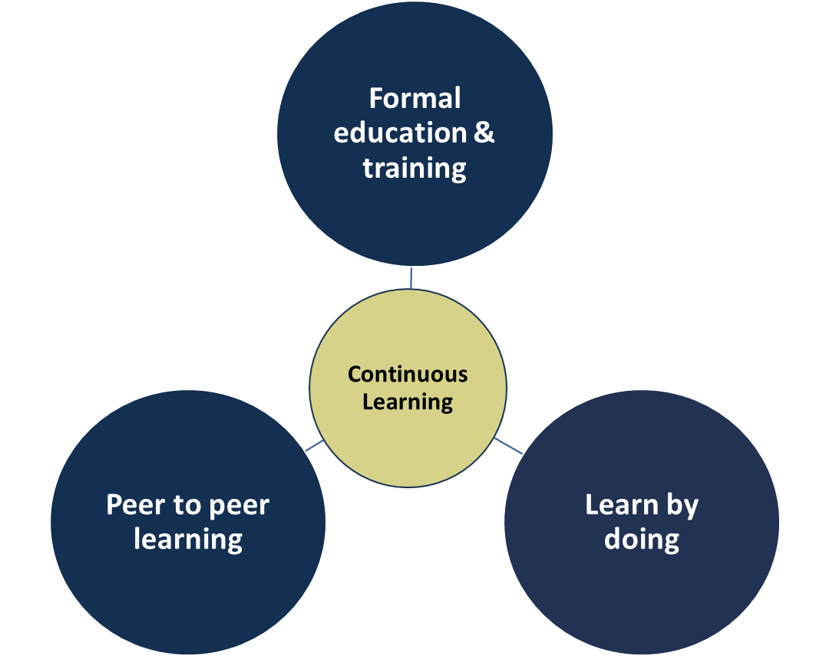
Introduction
Learning is undergoing some big changes and several educational commentators are predicting that the future of learning will be dramatically different with factors like global connectivity, smart machines and new media reshaping how we think about work, what constitutes work and how we learn and develop the skills to work in the future.
Fuelled by these trends, the importance of peer to peer learning is set to increase, a point highlighted in the 2017 Trends in Learning study by the Open University’s Institute of Educational Technology, which included learning from the crowd and learning through social media as two of six key trends in learning, both of which are integral to peer to peer learning.
This article defines peer to peer learning, lists its advantages and discusses participation options, highlighting the LCS Forum’s role in providing a digital space for the lean community.
Share this Image On Your Site
<p><strong>Please include attribution to leancompetency.org with this graphic.</strong></p>
<p><a href='https://www.leancompetency.org/lcs-articles/peer-peer-learning/'><img src='https://www.leancompetency.org/wp-content/uploads/Lean-Peer-to-Peer-Learning.jpg' alt='peer to peer learning' width='1000px' border='0' /></a></p>
What is Peer to Peer Learning?
Peer to peer learning is a mutually beneficial activity which recognises everyone as a teacher and a learner. It facilitates continuous development by encouraging like-minded individuals to engage in knowledge exchange through collaboration, networking, discussion and information sharing, enabling them to enhance their industry knowledge beyond formal education.
Peer to Peer Learning & Continuous Improvement
Continuous improvement, it can be argued, requires continuous learning, which can most effectively be achieved by blending three different ways of learning, as illustrated:

Formal education and training, typically classroom based – though increasingly online or blended, has an important role in introducing core concepts and ideas, ensuring understanding and enabling group participative learning via simulations, games and case studies. Formal training should provide confidence for learners to apply their newly gained knowledge in the workplace, often with support initially.
Learning by doing is a term often used to describe experiential learning, which is essentially learning through reflection on doing, which becomes the bedrock of ongoing competency development.
The third element, peer to peer learning supports and complements formal learning and learning by doing. It is less structured and formal and can take place in many contexts.
The growth of the use of the web and social media in particular means that virtual peer to peer learning is set to become increasingly important in the future. Indeed, some argue that a majority of learning takes the form of informal knowledge sharing in a peer-to-peer setting.
Advantages of Peer to Peer Learning in Business
Peer to peer learning is a flexible concept and can be applied to many different situations. Here are some of the key benefits for a lean oriented organisation:
- It is a simple way to learn from respected peers in your community.
- It is a cost-effective solution that doesn’t require additional training or workshops.
- It is a highly effective method of sharing information and people can learn real-life, applicable lessons from subject matter experts from all around the world, particularly when utilising web and e-learning resources.
- It allows you to continually develop as a professional and it promotes the learning organisation.
- Peers can help you find valuable solutions to specific industry problems.
How Can I Participate in Peer to Peer Learning?
There are many avenues in which you can take part in peer to peer learning. Here are some of the most common:
Social Networks
The nature of social media is inherently suited to peer-to-peer learning and social networking features like LinkedIn groups, Facebook groups and YouTube videos have made peer to peer learning more accessible by offering a virtual space for people to communicate and share knowledge.
Forums
Forums are another valuable online space in which peers can come together to discuss specific topics, ask questions and engage with relevant communities. Your organisation may have its own internal social media platform and the LCS Forum provides digital space for knowledge exchange amongst peers on subjects relating to lean.
Networking Events
Networking events are a great non-virtual platform for individuals in similar fields to meet and share their experiences, challenges, solutions and best
practice, in a face to face environment. This form of communication is highly effective in learning from peers.
Building Your Own Network
Bring peer to peer learning to you by hosting your own community. Build a network and invite peers to communicate on topics related to your industry.
How to set up a private community on LCS
- Register on the LCS forum
- Contact: membership@leancompetency.org with your private forum topic
- Provide a list of email addresses including people you would like to invite to the forum



